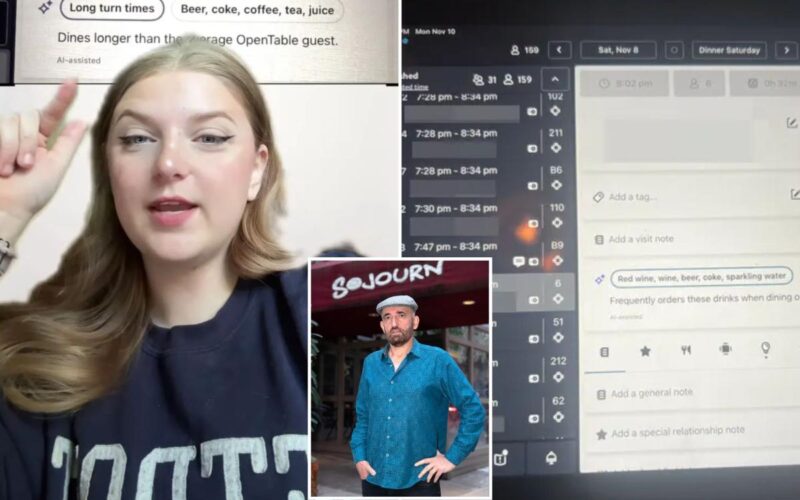What happens at the dining table no longer stays at the dining table.
If the city’s servers suddenly always seem to know your go-to drink order, or how you always order extra croutons on your salad – you’re not going crazy.
Reservation platform OpenTable is spying on its users and compiling personal information on guests to share with restaurants, both good and bad, from wine preferences to whether they cancel a same-day reservation.
This allows eateries to highlight things to your preference, save preferred seating or — if your AI notes reveal poor etiquette — cancel your reservation altogether, sources tell The Post.
“It’s not just spending habits or if they like Coca-Cola or bottled water. Now, we’re getting a taste of what a diner’s behavior at a restaurant is like: If they’re a late canceler, if they leave reviews a lot,” Shawn Hunter, a general manager for Sojourn Social on the Upper East Side told The Post of the feature he first noticed two weeks ago.
Indeed, when people dine out using OpenTable to make the reservations, hosts can now see purple stars with AI notes in their profiles such as: “Frequently orders these drinks while dining out,” listing everything from wine to cocktails, plus how much a guest pays for them.
Other notes get more specific, like “frequent reviewer;” “high spender;” “dines longer than the average guest;” and “late canceler,” noted Kat Menter, host at a Michelin-star restaurant in downtown Austin, who runs the food account EatingOutAustin.
“It’s for all of the restaurants you’ve ever gone to on OpenTable. They’ve saved what you ordered and how much you paid for it in your profile on the back end,” Kat revealed in a video on her page, noting her personal profile said: “Frequently orders juice.”
“This is OpenTable being way too obvious with the fact that they are data brokers. I guess most of us didn’t assume what we ordered, what we paid, how long we’ve sat for, and other info was tracked next to our name and phone number. But it is,” Menter told The Post in an email.
Hunter says diner data mining has already impacted service at Sojourn Social.
One guest booked for dinner Monday night at the bustling new American restaurant had “red wine, beer, coke, and sparkling water,” listed in the OpenTable AI-assisted portion of their profile.
So, Hunter sat them in the wine cellar of the restaurant thinking they’d enjoy a $68 bottle of Barolo.
“It helps us predict. I’m not going to put this person in the main dining room, they have to sit in the wine cellar. If we can say, ‘they’re going to get a red wine,’ I’m going to have maybe a sip or two on the table and glasses rather than the Happy Hour cocktail menu,” Hunter said.
Another diner, booked for the same evening, had the AI note “long turn times,” meaning the guest is likely to take time between courses and “dines longer than the average OpenTable guest,” prompting Hunter to sit them away from the more popular window seats.
OpenTable insisted to The Post their tech is “beneficial to both restaurants and diners.”
A spokesperson also pointed out that by “agreeing to OpenTable’s privacy policy, the diner grants OpenTable certain permissions to use their data — including the right to share their data with restaurants.
“Diners have the ability to opt-out of certain data sharing activities via their OpenTable account preferences,” they added.
A restaurant source said small business owners are now empowered to take control over their bottom lines like never before, showing The Post a screen grab of one diner’s profile which read: “Cancels within 24 hours of reservation more often than the average OpenTable guest.”
“We didn’t used to have this much information – we’re definitely more aware of things,” the source said, noting the restaurant could cancel someone’s reservation to make way for more sure-fire guests.
However, the source noted that comes with the risk of their restaurant getting a complaint or bad review from the person they cancel.
But otherwise they could save a table for a no-show and miss out on seating other guests, the source said.
Explaining how people get a bad reputation, the source said: “A lot of people [will] make a reservation at four places. Then they’ll ask their friends where they want to go and cancel on [the three other restaurants].
“We offer a good experience and we want good diners too,” they noted.
However, on the flip side, one restaurant industry insider warned the Post the new AI data could potentially do more harm than good, as it interprets people’s experiences at other restaurants and distills it down.
“There’s tremendous value a restaurant can unlock from its guest data, but if the data isn’t used responsibly, diners can be unfairly labeled based on one bad night or a misunderstanding that wasn’t their fault,” they noted.








